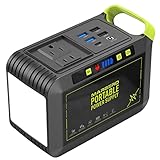How long can a solar generator run? This crucial question lies at the heart of reliable backup power planning and sustainable off-grid living solutions. Solar generators operate differently than traditional fuel-powered options, relying on a dynamic relationship between stored energy and solar recharging capabilities. Understanding your solar generator’s potential runtime isn’t just about battery capacity—it involves a complex interplay of factors including power draw requirements, solar panel efficiency, and environmental conditions.
For those seeking informational guidance on solar generator performance, it’s essential to grasp the basics of watt-hours (Wh) capacity and how it translates to real-world usage. Whether you’re preparing for emergency power outages or designing a complete off-grid power system, knowing what to expect from your solar generator ensures you’ll have power when you need it most.
By exploring the key factors that influence runtime and learning how to optimize your setup, you can unlock the full potential of your solar generator for both short-term backup and long-term sustainable power solutions.
Key Takeaways
- Calculate your solar generator’s runtime by dividing battery capacity (Wh) by device power draw (W)
- Maximize runtime by properly positioning solar panels and maintaining them for optimal charging efficiency
- Consider seasonal variations and adjust your power management strategy accordingly to ensure year-round reliability
- Choose the right-sized solar generator by matching battery capacity to your specific power needs and usage patterns
- Implement energy-saving techniques to extend runtime, such as using LED lights and energy-efficient appliances
Understanding Runtime Basics
Solar generator runtime depends on a complex interplay of factors, including battery capacity, power draw, and charging conditions. Unlike traditional generators, which run as long as fuel is available, solar generators operate based on stored energy and their ability to replenish that energy through solar panels. This dynamic relationship between energy storage and generation creates unique considerations for runtime planning.
The key to understanding runtime lies in understanding battery capacity and how it relates to your power needs. A generator’s capacity is measured in watt-hours (Wh), which indicates how much energy it can store and deliver over time. This measurement serves as the foundation for calculating potential runtime and planning power usage strategies.
Key Factors Determining Runtime
Several critical factors influence how long your solar generator can operate, and understanding their interplay is crucial for realistic runtime expectations. Battery capacity forms the foundation of runtime potential, acting as your energy reservoir. Larger capacity naturally means longer potential runtime, though this must be balanced against size, weight, and portability considerations. Modern lithium batteries offer impressive energy density, allowing for substantial capacity in relatively compact packages.
Solar panel input plays a vital role in sustained operation. The rate at which your generator can recharge affects immediate runtime and the potential for continuous operation. Higher-wattage solar panels can replenish energy faster, potentially allowing indefinite operation in ideal conditions. However, due to various environmental factors, real-world charging rarely achieves rated specifications.
Power draw from connected devices directly impacts runtime duration. The relationship between power consumption and available capacity is linear, but efficiency losses must be considered. Understanding your devices’ power requirements helps you plan realistic runtime expectations and manage power distribution effectively.
Typical Runtime Examples
Real-world runtime expectations vary significantly based on application and usage patterns. For small appliances and devices, runtime can be quite impressive. A 1000Wh solar generator can power LED lights drawing 10 watts for over 100 hours, providing extended illumination during power outages or outdoor activities. Smartphone charging capacity is similarly substantial, with the ability to recharge modern phones 40-50 times on a single generator charge.
Larger appliances naturally see shorter runtime due to their higher power requirements. A standard refrigerator, drawing 100-200 watts during operation, might run for 8-12 hours on a full charge of a mid-sized solar generator. Air conditioners, being particularly power-hungry, typically operate for 2-5 hours depending on their size and the generator’s capacity. Power tools present another high-draw scenario, though their intermittent usage pattern often allows for longer overall runtime periods.
Maximizing Runtime Performance
Optimizing your solar generator’s runtime requires a comprehensive approach to both power generation and consumption. Proper solar panel positioning is crucial, with panels ideally facing direct sunlight and adjusted seasonally for optimal angles. Regular cleaning and maintenance of solar panels can significantly impact charging efficiency, as even minor obstructions can reduce power generation.
Understanding what a solar generator is used for helps in tailoring performance optimization strategies to specific applications. For instance, emergency backup scenarios might prioritize energy conservation, while off-grid living applications focus on sustainable daily power management.
Environmental Factors and Runtime Impact
Geographic location and seasonal variations play a crucial role in solar generator performance. Summer months naturally offer longer runtime potential due to increased daylight hours and stronger solar radiation. Winter presents challenges with shorter days and weaker sun angles, often requiring larger solar arrays or more conservative power usage strategies.
Cloud cover significantly impacts charging efficiency, with heavy clouds potentially reducing solar panel output by 40-90%. This variation necessitates careful planning and potentially additional battery capacity for reliable operation during extended periods of unfavorable weather.
Temperature also affects both battery performance and solar panel efficiency. Extreme heat can reduce battery lifespan and charging efficiency, while cold temperatures may temporarily decrease available battery capacity. Understanding these environmental impacts is crucial for realistic runtime planning.
Runtime Calculations and Planning
Our solar generator category page provides comprehensive information about different models and their capabilities for those interested in exploring various solar generator options. When calculating potential runtime, consider both theoretical and practical factors. While the basic formula (Runtime = Battery Capacity ÷ Power Draw) provides a starting point, real-world performance typically achieves about 85% of theoretical calculations due to system inefficiencies and environmental factors.
Conclusion
Solar generators offer remarkable flexibility in providing power across diverse scenarios, from emergency backup to sustainable off-grid living. Their runtime capabilities, while variable, can be optimized through thoughtful planning and management of both power generation and consumption factors.
By understanding the relationship between battery capacity, device requirements, and environmental conditions, you can create a reliable power solution tailored to your specific needs.
The key to maximizing solar generator performance lies in strategic implementation—properly positioning solar panels, maintaining equipment, and balancing power usage against available capacity.
Geographic location and seasonal variations will always influence performance, requiring adaptability in your power management approach throughout the year.
To ensure you’re getting the most from your solar generator, take action today: assess your power needs, optimize your solar panel setup, and consider upgrading to energy-efficient devices.
By implementing these strategies, you’ll not only extend your generator’s runtime but also contribute to a more sustainable energy future. Explore our comprehensive solar generator guides to find the perfect solution for your power needs and take the first step towards energy independence.








Leave a Reply